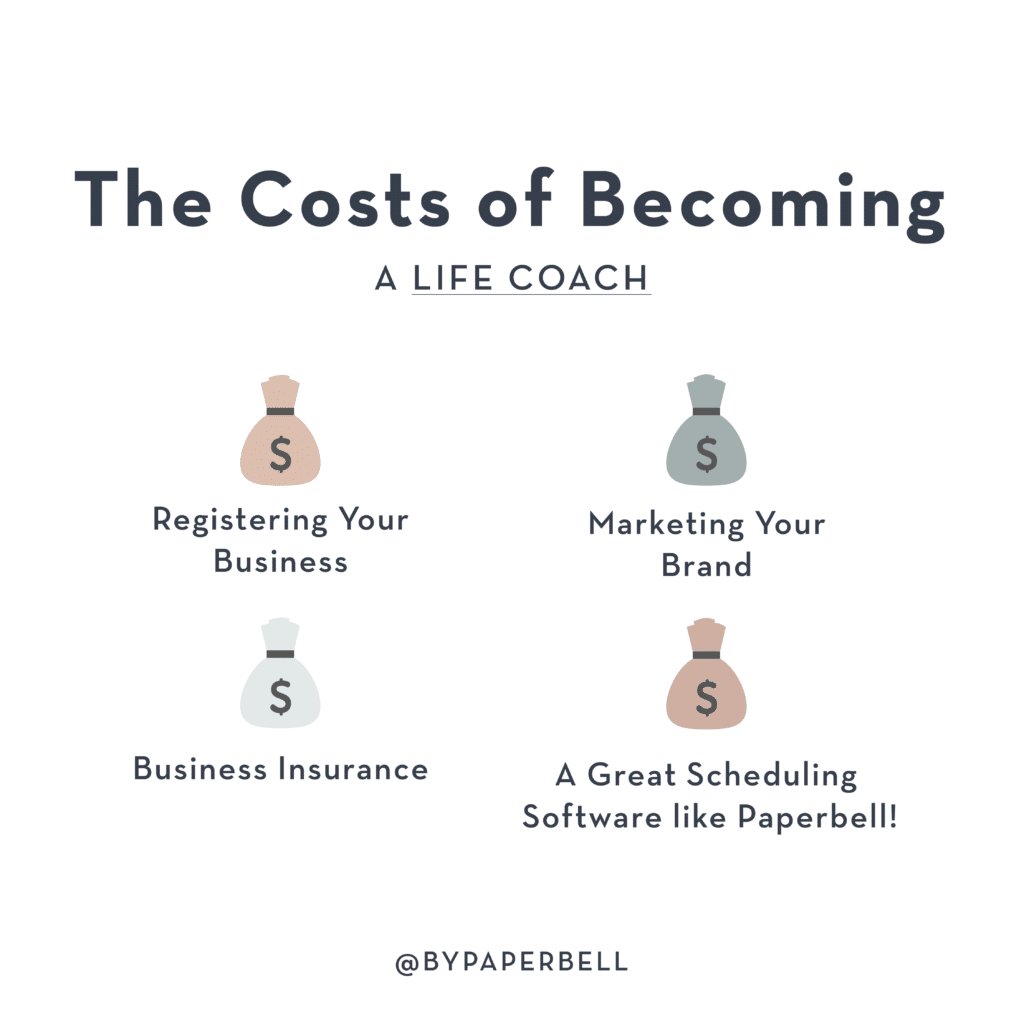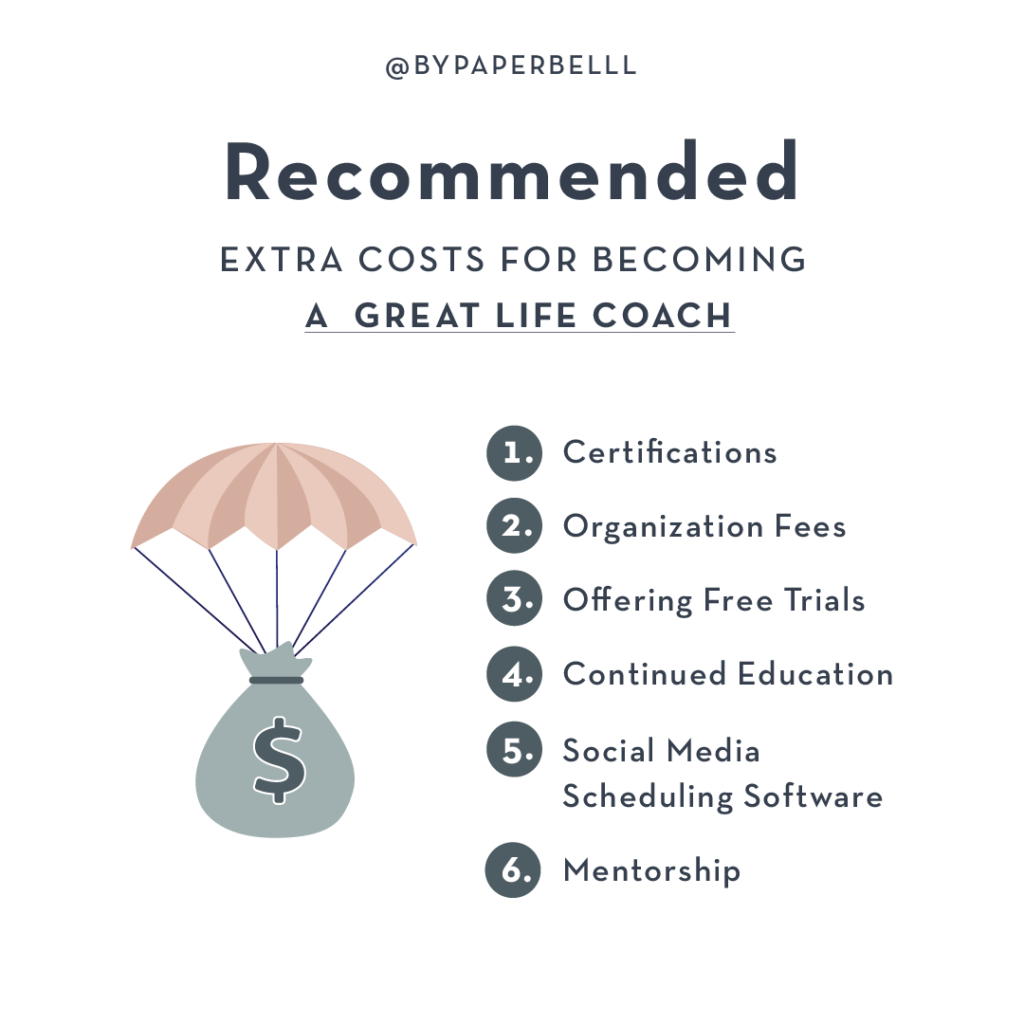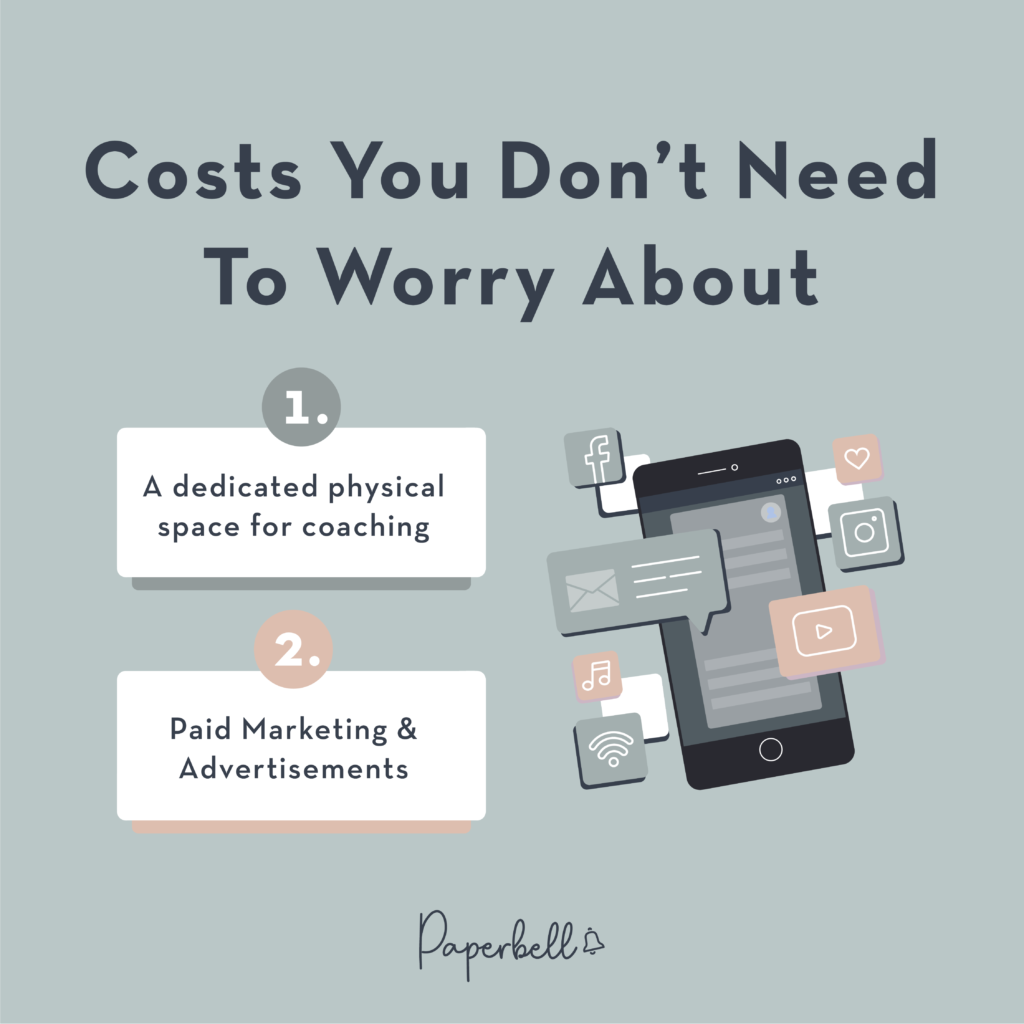So you’re ready to start a new career in life coaching, but you’re asking yourself, “How much will this cost me?”
Certification programs, client acquisition strategies, online tools that help you run your business… These can add up. However, there are ways to cut your expenses when you start or cross things out from your shopping list completely.
Let’s break down the cost of becoming a life coach.
Costs Life Coaches Have to Pay

Registering a Business
Registering your business is one of the first things you must do when entering the coaching world.
If you choose a sole proprietorship, costs will be minimal. Usually, you only need to pay if you register a business under a name other than your own (also called “doing business as”). Cost ranges from $10 to $100.
You can cross that off your list since you don’t need a license or permit to become a coach.
If you want to register an LLC, that’s a different story. You might want to register a separate business entity to protect yourself from business debts and legal liabilities.
The cost of setting up an LLC varies based on your state in the US and typically ranges from $50 to $500 for state filing fees. You might need to pay additional annual fees and hire agents or lawyers for assistance.
In general, you can run a coaching business perfectly fine under a sole proprietorship; it’s what most coaches do even as they grow if they don’t want to hire employees.
Business Insurance
Another necessary cost that you’ll face as a life coach is insurance. Though not compulsory, protecting yourself in legal matters is highly recommended.
The main types of insurance you should consider as a life coach are:
- Professional Liability Insurance
- General Liability Insurance
- Commercial Property and Auto Insurance
- Cyber Liability Insurance
- Workers’ Compensation Insurance (if you have team members on a payroll)
The cost will vary depending on your business’s specific needs and your selected coverage level. Insurance providers often offer a customizable business owner’s policy (BOP) for small business owners like life coaches, giving you a better deal.
Here are some life coach insurance providers we’ve covered on our blog from which you can get a quote.
Marketing Your Coaching Brand
To coach, you need clients. However, you don’t need to spend a fortune on marketing from the beginning.
When starting, allocating 5-10% of your expected annual revenue to marketing is generally a good practice. For example, if you anticipate making $50,000 in your first year, you should budget $2,500 to $5,000 for marketing.
This budget can cover website development, social media advertising, networking events, and other promotional activities. You can adjust it based on your brand’s most effective strategies and channels.
You can also leverage free or inexpensive marketing strategies such as:
- Sharing valuable content on social media
- Networking in online communities and local events connected to your niche
- Partner with other professionals to leverage their network
- Encourage client referrals
- Collect testimonials in exchange for a free session
These methods can help you build your brand and reach your target audience without significant costs.
[ Read: Level-up Your Life Coaching Website With These Incredible Examples And Templates ]
Optional Costs for Coaches

A Great Client Management Software
As a coach, you have many other responsibilities besides your sessions. These include scheduling appointments, processing payments, signing contracts, and managing client communications.
Doing all this manually or with many different online tools can take a lot of time and often lead to errors. However, a simple client management platform can help you automate everything.
One such tool designed specifically for coaches is Paperbell. It handles your scheduling, payments, and client management, allowing you to focus on what you do best—coaching.
By automating these processes, you not only save time but also enhance the client experience, leading to higher satisfaction and retention.
Paperbell costs $57 a month (or $49.50 when billed yearly), offering a cost-effective way to automate your admin tasks and reinvest that time in other activities that boost your business growth.
Coaching Certification
Life coaching isn’t regulated, so you don’t need to get certified to start practicing.
However, it gives you credibility with clients and may increase the amount you can charge them. If you’re unsure where to start, check out our guides on the best coaching life coaching programs.
Some online certificate programs cost as little as a few hundred dollars and can be completed in a few hours. At the other end of the spectrum are accredited organizations that offer up to a year of in-person training and personalized support, costing around $5,000-$10,000.
There’s a lot in between, and what fits you will depend on your niche and desired clientele. In general, training in coaching is an excellent investment in your expertise and capacity to help clients.
[ Read: Navigating The Coaching Industry: Do You Have To Be Licensed To Be A Life Coach? ]
Coaching Organizations
Joining a coaching organization isn’t necessary, but it has many benefits. It can help you do the following:
- Network with like-minded professionals
- Keep you up to date with the latest trends and practices
- Access resources and support to grow your coaching business
Yearly membership fees at coaching organizations range from $100 to $1,000. Some of them offer different tiers of membership with varying benefits that you can choose from.
Costs New Coaches Don’t Need

When starting as a coach, you don’t need to plow everything into your business at once. Here are the costs you can put off at the beginning.
A Dedicated Coaching Space
Having a dedicated space for your sessions is excellent, especially if you run a local business. However, you can coach online from your home office just as effectively to cut costs.
Later on, as you grow your income, you can consider joining a coworking space where you can book meeting rooms for your sessions—both online and offline—to coach undisturbed.
Expensive Ad Strategies
Paid ads are effective when well-optimized. However, the cost can quickly add up while you figure out what niche and targeting work best for you.
Start small or focus on low-cost marketing strategies, such as a limited number of trial sessions or creating online groups.
Later, you can set aside a recurring monthly budget for your Facebook and Google ads or hire someone to run your campaigns.
[ Read: The Beginner-Friendly Ultimate Guide to Facebook Ads for Life Coaches ]
Costs That’ll Help You Grow Your Coaching Business
Once you’re past the initial stage of setting up your business, you can incorporate these elements into your yearly budget to grow.
Continued Education
Coaches never stop learning. To grow, you’ll need to invest cash into additional training and events that help you expand your expertise.
Themed workshops and retreats can offer invaluable tools that you can incorporate into your coaching process to help your clients reach more significant breakthroughs.
The more you learn, the more you can earn, so budgeting for your continued education every year is a great idea.
Social Media Management
Building a social media presence requires consistency, but managing multiple accounts can take time.
One option is to invest in a social media scheduling software like Meet Edgar. This way, you can curate content and post to your different accounts from a single platform.
The other option is to hire a virtual assistant or social media manager to manage your content—and perhaps your ads, too.
Coaching and Mentorship
It’s always easier to listen to someone who has walked the path ahead of you than to figure it out on your own. While courses can give you a general breakdown of how things are done, a coach or mentor can guide you in your specific situation.
This also allows you to put yourself in your client’s shoes and experience what you offer from the other side.
It’s Time to Add Up the Numbers
Now that you have the general costs of becoming a life coach, it’s time to create a budget plan for everything you want to invest in in the upcoming quarter and year.
Prioritize the essentials first and then create a wish list for the long-term future of your coaching practice. Take it one step at a time and focus on establishing stability first to grow on solid ground.
[ Read: How To Invest In Your Business: The Four High-Return Moves For a Coaching Practice ]

Editor’s Note: This post was originally published in February 2021 and has since been updated for accuracy.








